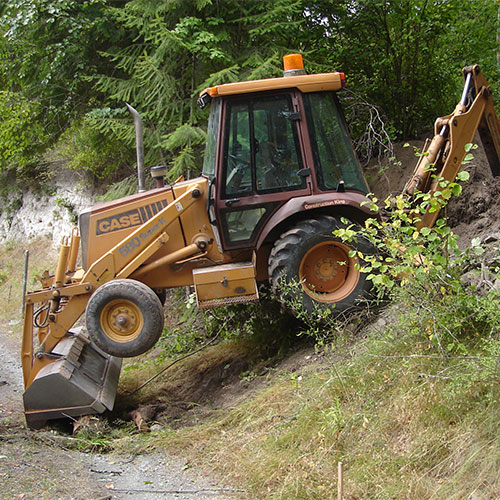Septic Ohio - Comprehensive Septic System Solutions in Ohio
Septic Ohio - Comprehensive Septic System Solutions in Ohio
Blog Article
Comprehensive Excavation Techniques: Grasping the Basics for Success
In the realm of construction and civil engineering, the importance of reliable excavation techniques can not be overemphasized. The cautious preparation, exact execution, and careful attention to information called for in excavation jobs demand an extensive method that incorporates numerous fundamental facets. From first soil evaluation to the execution of precaution and normal development tracking, understanding these core elements is necessary for accomplishing success in any kind of excavation endeavor. The real proficiency lies not simply in understanding these principles yet in effortlessly integrating them to navigate the complexities of excavation projects with finesse.
Recognizing Excavation Task Preparation

Effective excavation jobs are developed on the structure of meticulous and comprehensive planning. The initial phase of any excavation project is the preparation phase, where important choices are made that can significantly impact the end result of the project. During this phase, it is vital to gather all appropriate information regarding the site, including topographical surveys, dirt structure, and any kind of potential dangers that might exist. Recognizing the task extent, budget plan, and timeline restraints is vital for creating a comprehensive excavation strategy that makes sure the project's success.
One key facet of excavation job preparation is the advancement of an in-depth timeline that lays out the sequence of target dates, activities, and milestones. This timeline serves as a roadmap for the project group, allowing them to track progress and make needed adjustments to ensure the job remains on timetable. Additionally, a well-defined budget plan that makes up all expenses, consisting of equipment service, labor costs, and products, is essential for staying clear of expense overruns and delays. By very carefully taking into consideration all these variables during the planning phase, excavation tasks can be carried out successfully and successfully, resulting in effective end results.
Soil Analysis and Website Assessment
Performing extensive dirt analysis and website evaluation is a vital action in the preparation phase of any excavation project. Dirt evaluation entails establishing the composition, structure, and residential or commercial properties of the dirt at the excavation site. This info is critical for understanding the dirt's bearing capability, moisture web content, and possibility for erosion, which are crucial consider identifying the excavation approaches and equipment needed for the task.
Site examination surpasses soil evaluation and incorporates a broader analysis of the overall site problems. This evaluation consists of determining any prospective dangers, such as below ground utilities, environmental problems, or unstable terrain, that might affect the excavation procedure. By completely assessing the website, job managers can develop reliable excavation strategies that prioritize security, performance, and environmental security.
Making use of sophisticated modern technologies like ground-penetrating radar, dirt sampling, and drone studies can enhance the accuracy and performance of dirt evaluation and site analysis. Spending time and resources in these preliminary actions can eventually save time and prevent costly hold-ups or problems during the excavation process.
Equipment Selection and Application
Effective excavation jobs rely greatly on tactical equipment selection and usage to ensure optimum efficiency and performance. Choosing the right equipment for the work is essential in making best use of efficiency and decreasing downtime. Elements such as the kind of soil, deepness of excavation, and project extent play a considerable function in establishing one of the most appropriate equipment for the job at hand.

Along with picking the appropriate devices, appropriate usage is key to project success. Operators needs to be trained to handle the devices safely and successfully - lancaster excavation. Normal upkeep checks and timely repairs aid stop break downs and make sure regular efficiency throughout the job
Security Steps and Regulations Compliance
In the realm of excavation tasks, focusing on precaution and conformity with guidelines is critical to making certain a safe and secure and legitimately audio operational atmosphere. Precaution incorporate a variety of methods, including conducting thorough site assessments, carrying out appropriate signs and barriers, and supplying sufficient safety and security training for all employees associated with the excavation websites procedure. Adherence to policies, such as OSHA demands in the United States, makes sure that the excavation project fulfills the required standards to secure employees, bystanders, and the surrounding environment.

Surveillance Progression and Adjusting Methods
How can project supervisors efficiently track the advancement of excavation tasks and adapt their strategies appropriately to optimize results? Tracking progress is essential for making certain that excavation jobs remain on track and meet deadlines.

Verdict
In verdict, mastering the basics of extensive excavation techniques is important for the success of any job. By comprehending job planning, assessing soil and site conditions, choosing suitable tools, abiding by security laws, and keeping track of progress, task managers can guarantee a smooth and efficient excavation procedure. Carrying out these techniques will certainly lead to effective outcomes and decrease possible risks or setbacks throughout the excavation job.
The first stage of any excavation job is the planning stage, where crucial choices are made that can considerably affect the outcome of the job. Understanding the task budget, timeline, and range restraints is important for developing an extensive excavation plan that ensures the task's success.
Exactly how can forecast managers properly track the development of excavation tasks and adapt their approaches as necessary to optimize outcomes? By very closely monitoring progression and being willing to adjust methods, task supervisors can enhance the general success of excavation jobs.
By comprehending task preparation, assessing soil and website conditions, picking ideal equipment, complying with safety policies, and monitoring progression, project supervisors can make certain a smooth and reliable excavation process.
Report this page